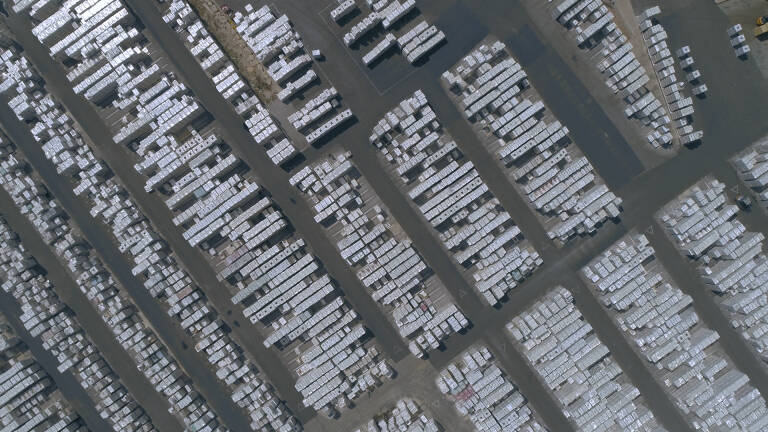
The six brands that make up the Pamesa Business Group, including TAU Cerámica, are joining this historic change
Fernando Roig, President of Pamesa Business Group, and Jorge Arévalo, CEO of Ecombustible, have unveiled the world’s first plant capable of fully replacing natural gas. Located in Onda, this facility uses eCombustible, a new fuel with variable characteristics that can be used in existing equipment without modifications.
How eCombustible Works
The process for generating eCombustible uses electric energy to convert water into fuel through a special and improved electrolysis technique, transforming hydrogen with electromagnetic pulses to create a highly efficient fuel.
Water is processed in a treatment plant where elements like heavy metals and lime are removed. It then enters the system where it decomposes into hydrogen and oxygen.
The water decomposition process takes place in the Skids. Each Skid has 36 cells, each of which is powered by electrical pulses at special frequencies that significantly reduce energy consumption.
Next, the hydrogen passes through a magnetic reactor that enhances the characteristics of the hydrogen molecule, resulting in a fuel with higher calorific value and improved combustion properties compared to conventional hydrogen.
Two storage tanks separately store the production of hydrogen and oxygen for immediate use. Finally, the hydrogen and oxygen are transported to the burner where they recombine to form the final eCombustible molecule.
The patented eCombustible process achieves a clean and efficient fuel that only releases water vapor during combustion, completely eliminating carbon emissions. The efficiency of eCombustible can replace 100% of traditional fossil fuels, representing a historic transformation in thermal energy processes.
The Atomization Process
Atomization plants produce the raw material used in the production of ceramic products. The process involves mixing water (which, in the case of Pamesa Group, is recycled) with clay and then evaporating it by applying temperature to obtain the atomized material used in ceramics. Atomization accounts for 60% of the total thermal energy consumed by the ceramic sector, which is why Pamesa Group has chosen it as the starting point for its energy transition. It is a true revolution for Pamesa, the tile industry, and the world.
A Historic Milestone
After years of effort and private investment, Pamesa Group now has the world’s first carbon-free atomization plant that is 100% independent. In fact, compared to other clean energies, eCombustible does not depend on external factors such as sunlight or wind. During the project presentation, Fernando Roig, President of Pamesa Group, stated, “We have taken a momentous step in Pamesa Group because this project represents an energy revolution by being able to generate our own hydrogen-based fuel in our own facilities and at a much more competitive price than natural gas. Most importantly, it is completely carbon-free. This is the beginning of a new era towards a more sustainable future, and we are proud to lead this change.”
Jorge Arévalo, CEO of eCombustible Energy, pointed out, “This eCombustible-Pamesa partnership is evidence of the power of collaboration and innovation to drive sustainable energy solutions. I believe eCombustible Energy has a crucial role to play in the transition to a low-carbon future, and this facility marks a significant step towards achieving that goal.” The ceramic plant in Onda marks the beginning of a new era in ceramic production, where clean and renewable energy takes center stage. By gradually phasing out the use of gas in all production processes, Pamesa Group is taking a firm step towards achieving its environmental goals and leading the way in the adoption of sustainable energy in the ceramic industry.
About Pamesa Business Group
Established as one of the world’s largest ceramic groups, Pamesa Business Group is the leading European producer and the fourth-largest globally, representing 20% of the sector’s production in Spain and experiencing a fivefold increase in turnover over the past 10 years.
The group’s industrial design, manufacturing, distribution, and sales of ceramic products are marketed through its six brands: Pamesa, TAU, Prissmacer, Ecoceramic, Geotiles, and Navarti. Pamesa Group has a strict corporate social responsibility policy, with a focus on sustainability and a vision to improve the world around it. The company has a zero-waste policy, with key areas of action including recycling 100% of solid and liquid waste, recycling wastewater from the group and other companies in the sector, recovering heat from factory furnaces, and recycling pallets. Additionally, the group has solar panels installed on all its facilities’ rooftops, with a total installed capacity of 20.79 MW in solar panels, predominantly powering its production plants with self-generated ecological electricity.
About eCombustible
Founded in 2010 by entrepreneur and investor Jorge Arévalo and headquartered in Miami, eCombustible Energy offers a long-term fuel supply solution. This energy is designed to provide the world’s most fossil fuel-dependent industries with a carbon-free, cost-competitive fuel that requires minimal modifications to existing customer equipment. The efficiency of hydrogen-based fuel has been validated through independent testing and evaluations conducted by third-party engineering firms. For more information, visit www.ecombustible.com.
To continue reading
TAU brings color and texture to the installation The Light in the Darkness at Milan’s Fuorisalone
Leer
See You in Orlando: TAU presents SENSE at Coverings
Leer
TAU participates in the 60th edition of Casa Decor
Leer
